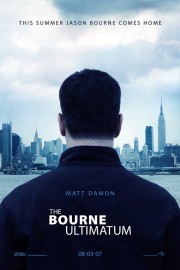The Bourne Ultimatum
As third films in a series goes (and one hopes that like Matt Damon, Universal will walk away from this series after “Ultimatum” to not ruin a solid franchise), you could do a lot worse than Paul Greengrass’ second time out as director of this gritty spy thriller saga, inspired by the novels by Robert Ludlum (I’d say based on, except I’ve heard major tinkering was done by screenwriter Tony Gilroy (who this time is aided by writers Scott Z. Burns and George Nolfi after going solo the first two “Bournes”) in bringing “Ultimatum” especially to the screen). It’s not only an inventive piece of storytelling in the way it ties into its’ predecessors, but it connects all the dots in the story in a satisfying manner while also leaving just enough room for more if the mood strikes the filmmakers (though as stated earlier, my hope is that they leave it be, especially if Damon’s done with the franchise). Greengrass’ visceral, handheld approach to the blistering action sequences is just as chaotic as it was during 2004’s “The Bourne Supremacy” (for my money, the most compelling overall of the series), which can take you out of the movie just as quickly as it can put you on the edge of your seat, but it also is a natural progression from the juiced-up style of Doug Liman’s “The Bourne Identity,” where the action scenes may have been clearer to follow, but the impact was somewhat dulled by the fact that you didn’t feel like you were in the middle of it all. But Greengrass puts you right there with Jason Bourne, a man whose actions speak volumes more than his words, in this final chapter of Bourne’s search for answers about his past.
When last we saw Jason Bourne (played with riveting determination and physicality by the perfectly-cast Damon, who does many of his own stunts), he had just landed in New York, where CIA agent Landy (the ever-compelling Joan Allen) has just thanked him for his help in uncovering a conspiracy in the agency and has told him his real name, which is all he’s really ever wanted since being pulled out of the water in “Identity.” (But life’s a little more complicated when you can’t remember who you are, much less that you’re a black ops assassin for the CIA, and the very idea of your being alive is dangerous to the establishment.) Well, from there, “Ultimatum” doubles back on the story to fill in the blanks of what happens after Bourne survives a breathless car chase in Moscow, and is eventually led back to America as the pieces continue to be put together as to who he was, and how he got here. Immediately, Greengrass and Gilroy- in doing this- had my attention, and they don’t let go of it as Bourne tracks down a British reporter who’s become a threat to the system in his series of articles about the Treadstone project and something called Blackbriar, another assassin program that evidently started with Bourne. Needless to say, it isn’t long before Bourne’s on the run again from the CIA operatives- including high-ranking officials Scott Glenn as Ezra Kramer and David Straithern, excellent as always, as Noah Vosen- and trying to escape his pursuers in exotic locales like Moscow, London, Tangier, Turin, and finally New York, where- needless to say- the story doesn’t end at that call between Landy and Bourne- we still have another reel left…
In three days this week, I watched all three “Bourne” films, and found that “Identity” was still an entertaining introduction to Bourne’s universe, and that “Supremacy” (even more so than when I last watched it on opening day) was a brilliantly inventive follow-up, deepening the story with a sense of loss and regret that made you feel the personal story behind Bourne’s steely-eyed journey even as he was being chased on foot at the sight of his first kill or on four wheels through the streets of Moscow in the film’s brutally-entertaining finale. Against such high-water marks for the action genre, it can be no surprise that “Ultimatum” rates as a disappointment, comparitively speaking. Make no mistake, Greengrass (coming off his Oscar nomination for last year’s monumentally-devastating “United 93”) delivers the action goods big time- especially during a chase in Tangier that happens both on motorcycle and on foot (and over rooftops), a cat-and-mouse game in a Waterloo terminal evocative of an equally-imaginative sequence in “Minority Report,” and a car chase on the crowded New York City streets that can’t help but evoke memories of “The French Connection”- and keeps us intrigued by the different directions in which the story fills in its’ blanks. But it’s all flash and fury set to John Powell’s continually-exciting music (his scores in this trilogy have to rank with the best for the genre), shot through Oliver Wood’s go-for-broke camera angles, and cut like a caffinated Bond film by “United 93” Oscar nominee Christopher Rouse. The heart and soul of the story rests entirely on Damon’s shoulders, as the story itself is unburdened by the sympathy (even the brief appearance of Julia Stiles as former Treadstone coordinator Nikki Parsons, who aligns herself completely with Bourne this time out, lacks the emotional and sexual heat it probably should) that drove “Identity” and “Supremacy.” Thankfully, Damon’s just the man for the job; though his typical charm (on display in the “Ocean’s” movies and others) is muted for this film, you can’t help but like Damon and side with Bourne as he goes through the trouble to run, shoot, and jump his way into (and out of) danger in order to discover himself. He’s the motor that keeps this well-oiled cinematic machine running, and Greengrass has his foot firmly placed on the gas peddle. I can’t imagine you’ll want it any other way.










